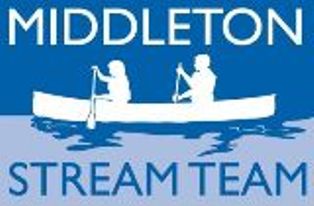
Great Blue Heron strides confidently along in shallow water on a bank of the Ipswich River. In the background is a lush patch of Pickerel Weed.
Suzanne Richardson photo
Water Closet for 10-4-13 Heron’s Lively Heavy Meal
On a recent early fall afternoon a Great Blue Heron caught a large fish it couldn’t easily swallow. An old Closeteer visiting Logbridge Landing on the Ipswich River in Middleton watched for five minutes as the attempt to get uncut sashimi into gut where it belongs went on. The fish about a foot long, at 200 feet unidentified by the human, might have differed with this assertion. The poor beast struggling in the predator’s long beak was repeatedly dropped. On the river’s edge among heron-head high Smart Weeds the one sided struggle went on. The heron lanced its lively prey flipping around on the ground several times. The human voyeur looked away for a second and missed the beginning of the swallowing. As he turned back a great swelling quickly moved down the heron’s long neck. During the moment of success and after, the heron’s head was high. The scene wasn’t comfortable for the Closeteer. He felt a lump in his throat and thought of a glutton at table eating too fast. The solitary heron, accustomed to catching large cumbersome prey, gave no thought to manners. Its ancestors had been eating fish tens of millions of years before humans evolved.
The Closeteer wasn’t the only one watching. In the water nearby the heron at lively feast was a cormorant fishing. It stayed close, diving and rising after prey, perhaps encouraged by the heron’s big catch.
The scene reminded the Closeteer of watching with his son-in-law and grandson a heron fishing in the Exeter River rapids on Father’s Day several years ago. The following is The Water Closet’s essay of June 2010 written a few days later.
GREAT BLUE HERON
Just a couple hundred feet below Exeter New Hampshire’s busy center, the Exeter River tumbles over two dams and rocky rapids to tidal water. The mills once powered by this descent are gone. The same can be said for a hundred other New England towns so sited.
Several years ago a Closeteer and friend put a canoe in just below the slope of white water and leisurely paddled seven miles on an ebb tide to Great Bay where the Lamprey, Exeter, and Piscataqua rivers mix with seawater. Twice daily, a fast flood through Portsmouth Harbor fills the bay and enriches it. The mix then leaves as quickly as the cold seawater came.
On the edges of these dynamic movements, the brackish marshes teem with life. On their paddle the most noticeable inhabitants were Great Blue Herons. They encountered these solitary giants on rounding every bend and passing cove. Herons standing in water stalking fish as they have done since the last continental glacier’s ice a dozen millennia ago and who knows how many thousands before that.
On Father’s Day, in drizzle riding in on cold nor’easter air, an old Closeteer, son-in-law and five-year old grandson after lunch at the Loaf and Ladle, perched on a bridge above the upper dam just down from the square to see the sights. The water in the wind blew around them as that collected from fourth a county descended underneath. Below just downriver on a submerged boulder, stood a Great Blue Heron stalking fish we couldn’t see. Every few minutes he leaned down from an upright stance, great beak pointing down. The legs slightly spread as the whole body and long neck cocked. Then faster than we could see, the skinny neck thrust its lance. As the head almost instantly arose from the water, they got a glimpse of a fish before it was swallowed. In two seconds he was erect and waiting.
In fifteen minutes four fish were caught. Their eyes were as intent upon the fisher as his upon the rapid flow. The last victim was alewife size; he shook it a few times while shifting its position to head first in his beak. They wondered if it could be swallowed; it was, a bulge quickly rippled down its neck.
Great Blues are four feet tall with handsome wings spanning six feet and yet these athletes weigh less than eight pounds. They concluded that their subject was largely bone, cartilage, tendon, trim long muscle, and feather perfected over countless generations. No wonder it held their eyes so long. They, hesitant to leave, suspect that despite acres of supermarkets just down the road, stalkers and fishers are still in us.
———————————————————————————————————
THE WATER CLOSET is provided by the Middleton Stream Team: www.middletonstreamteam.org or <MSTMiddletonMA@gmail.com>
